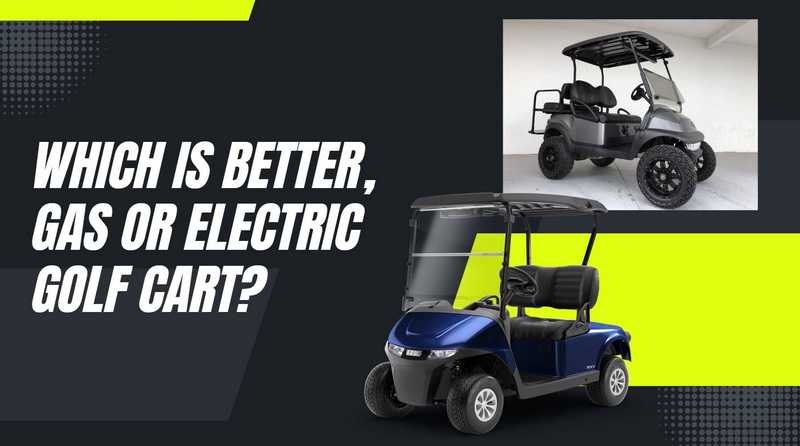Content Menu
● Advantages Of Gas Golf Carts
● Disadvantages Of Gas Golf Carts
● Advantages Of Electric Golf Carts
● Disadvantages Of Electric Golf Carts
● Performance Comparison
● Cost Considerations
● The Best Golf Carts Available Today
>> Top Gas Golf Carts
>> Top Electric Golf Carts
● Navigating the Buying Process
● Conclusion
● FAQs
>> 1. Which golf cart is better for hilly terrains?
>> 2. How long do electric golf cart batteries last?
>> 3. Do gas or electric golf carts require more maintenance?
>> 4. Can electric golf carts handle heavy loads?
>> 5. What are the cost differences between gas and electric golf carts?
Golf carts have become a staple within many golf courses, neighborhoods, and even farms. They represent a practical and fun way to navigate large properties with ease. However, one query that consistently arises among enthusiasts and buyers alike is whether gas or electric golf carts reign supreme. The choice between a gas-powered or electric golf cart hinges on various factors including performance, costs, and personal preference.

Advantages Of Gas Golf Carts
Gas golf carts have been favored for their powerful engines and the ability to travel longer distances without the need for recharging. Here are some significant advantages:
- Performance: Gas golf carts generally provide better performance in terms of top speed. They are ideal for hilly terrains and can operate over longer periods without needing to pull over for a charge.
- Refueling Convenience: Refueling a gas cart takes only seconds compared to the hours required to charge an electric cart. This can be particularly useful on a busy golf course.
- Lower Initial Costs: Typically, gas golf carts carry a lower sticker price compared to their electric counterparts, making them financially appealing.
Disadvantages Of Gas Golf Carts
Despite the advantages, there are also drawbacks:
- Maintenance Costs: Gas golf carts require more maintenance than electric ones, necessitating oil changes and regular servicing.
- Environmental Impact: Gas golf carts emit fumes that can detract from the golfing experience and affect air quality.
Advantages Of Electric Golf Carts
Electric golf carts are increasingly popular due to their eco-friendliness and low operational costs.
- Environmental Benefits: With zero emissions, electric golf carts are the greener choice, aligning with the values of sustainability that many people prioritize today.
- Cost-Effectiveness: Although they may come with a higher upfront cost, electric carts generally lead to greater savings on maintenance and operational expenses over time. There is no need to pay for gas, and upkeep tends to be simpler with fewer moving parts.
- Quiet Operation: Electric carts operate nearly silently, providing a serene and peaceful experience on the course.
Disadvantages Of Electric Golf Carts
However, they are not without their pitfalls:
- Limited Range: Electric carts can run out of charge, particularly on longer rounds or hilly courses. It's crucial to factor in battery life and the availability of charging stations.
- Battery Replacement: Over time, the cost of replacing batteries can be substantial, adding to the overall expense of ownership.

Performance Comparison
In terms of performance, both types of golf carts will reach speeds up to 25 miles per hour. However, gas golf carts tend to have a stronger horsepower, making them more suitable for transporting heavier loads or navigating steep inclines. In contrast, electric carts, with their instant torque, can accelerate more quickly.
| Feature | Gas Golf Carts | Electric Golf Carts |
|---------|----------------|---------------------|
| Top Speed | 20-25 mph | Up to 20 mph |
| Horsepower | Higher | Lower |
| Refueling/Charging Time | Seconds | Hours |
| Maintenance Needs | More frequent | Less frequent |
Cost Considerations
The overall cost of ownership goes beyond the initial purchase price. Consider the following:
- Gas Carts: While they might be cheaper initially, ongoing fuel costs and maintenance can add up.
- Electric Carts: Though more expensive to purchase, the long-term savings on fuel and repairs can make them a great investment.
The Best Golf Carts Available Today
When considering which golf cart will suit your needs best, researching the available models is essential. Below are a few top contenders for both gas and electric options:
Top Gas Golf Carts
1. Club Car Onward: This model is known for its sleek design and excellent performance on rugged terrain. It's powered by a reliable gas engine and is customizable to fit various preferences.
2. Yamaha Drive2: Yamaha has a great reputation for reliable gas carts. The Drive2 offers comfort and performance with advanced features that make it a leader in its category.

Top Electric Golf Carts
1. EZGO RXV: Known for its durability and quiet operation, the RXV electric golf cart is perfect for golf courses committed to reducing emissions.
2. Club Car Tempo: Combining cutting-edge technology with an efficient electric powertrain, the Tempo is favored for its smooth ride and range.
Navigating the Buying Process
When deciding to purchase a golf cart, consider the following steps:
1. Budget: Determine how much you are willing to spend, including all associated costs.
2. Usage: Consider what you will primarily use the golf cart for — whether just for golf or for neighborhood cruising or chores on a property.
3. Test Drive: Always take a test drive to get a feel for the cart's handling, comfort, and features.
4. Warranty and Service: Check for warranties offered and the availability of maintenance services nearby.
Conclusion
Ultimately, both gas and electric golf carts have their own merits and drawbacks. Each type caters to different user needs depending on factors like terrain, environmental concerns, and budget. In the decision-making process, weighing these variables will lead you to the cart that best suits your lifestyle and preferences.

FAQs
1. Which golf cart is better for hilly terrains?
Gas golf carts generally perform better on hilly terrains due to their superior horsepower.
2. How long do electric golf cart batteries last?
If maintained properly, electric golf cart batteries can last up to 10 years.
3. Do gas or electric golf carts require more maintenance?
Gas golf carts require more maintenance, including oil changes and servicing.
4. Can electric golf carts handle heavy loads?
Electric golf carts are less suitable for heavy loads compared to gas carts.
5. What are the cost differences between gas and electric golf carts?
Gas carts typically have lower upfront costs but higher long-term fuel and maintenance costs, while electric carts are more expensive to buy but cheaper to operate over time.











































